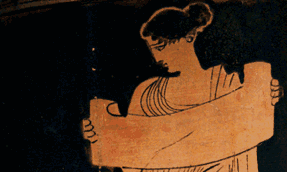• the Longest Word •
• Aristophanes •
Where do I find it?
Among other things that ancient Greek has offered to the world, is its longest word. It is coming from a comedy of Aristophanes titled “Ecclesiazusae” (Assembly Women) 1169-74. It presents a recipe of an ideal state-sponsored banquet that would persuade everyone that the new regime is rightly blessed, at least as its author has imagined it. The choice of ingredients, probably of the most exquisite in the Athens of the 5th century BCE, would not fail to prove this blessing. But also, beyond misunderstanding, the need for increase in public spending. On plumbing fixtures…
What is exactly written?
If you can decipher ancient Greek you should be able to read this:
« λοπαδοτεμαχοσελαχογαλεο-κρανιολειψανοδριμυποτριμματο-σιλφιοκαραβομελιτοκατακεχυμενο-κιχλεπικοσσυφοφαττοπεριστεραλεκτρυον-οπτοκεφαλλιοκιγκλοπελειολαγῳο-σιραιοβαφητραγανοπτερύγων »
which transliterates to:
" Lopado-temakho-selakho-galeo-kranio-leipsano-drim-hypotrimmato-silphio-karabo-melito-katakekhymeno-kikhl-epi-kossypho-phatto-perister-alektryon-opto-kephallio-kigklo-peleio-lagoio-siraio-baphe-tragano-pterýgon "
The ingredients
λοπάς (dish, meal ), τέμαχος (fish slice ), σέλαχος (shark, ray ), γαλεός (tope, dogfish, small shark ), κρανίον (head ), λείψανον (remnant ), δριμύς (sharp, pungent ), ὑπότριμμα (gen. sharp-tasting dish of several ingredients grated & pounded together ), σίλφιον (laserwort ), κάραβος (crab, beetle, or crayfish ), μέλι (honey ), κατακεχυμένος (poured down ), κίχλη (wrasse, thrush ), ἐπί (upon, on top of ), κόσσυφος (a kind of sea-fish and a blackbird ), φάττα (wood pigeon ), περιστερός (domestic pigeon ), ἀλεκτρυών (chicken ), ὀπτός (roasted, baked ), κεφάλιον (diminutive of “head” ), κίγκλος (dabchick ), πέλεια (pigeon ), λαγωός (hare ), σίραιον (new wine boiled down ), βαφή (dipping ), τραγανός (crunchy ), πτέρυξ (wing, fin )
Is it dangerous?
• First things first, I would wholeheartedly like to discourage you trying the recipe at home! :-D
• Secondly, as can be seen in the images, reading this word alone can be detrimental to man and god alike.
On the left supposedly a human falling midway asleep, on the right a Muse wondering how she’s managed to reach the end.


Hear it in the original ancient Greek! (reconstructed pronunciation)

